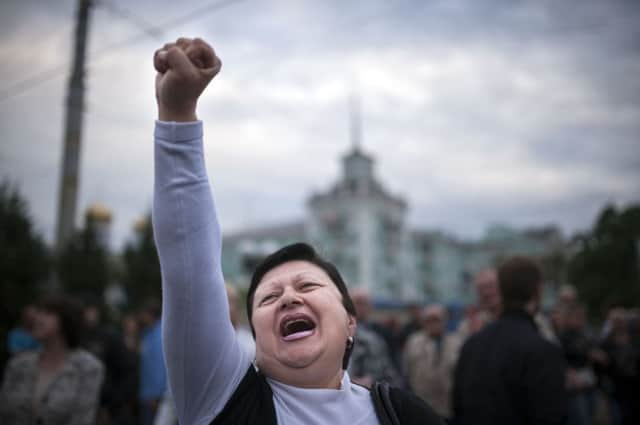Ukraine polls ‘covering up murder and kidnappings’


Ukraine’s president, Oleksander Turchynov, denounced the votes as a “farce” to cover up “murders, kidnappings, violence and other serious crimes”.
His condemnation came as separatist organisers claimed that 96 per cent of voters in Luhansk and 89 per cent in Donetsk were in favour of self-rule in a turnout of 75 per cent.
Advertisement
Hide AdAdvertisement
Hide AdBut Mr Turchynov said the vote had “no legal basis”, and the interior ministry had put turnout at 24 per cent in Luhansk and 32 per cent in Donetsk.
Separatists in the east last night called for Moscow to “absorb” their provinces into the Russian Federation, as happened following a referendum in Crimea in March.
Mr Turchynov said in an address to parliament: “These processes are inspired by the leadership of the Russian Federation and are destructive to the Donetsk and Luhansk regions’ economies and threaten the lives and welfare of citizens.
“The farce that terrorist separatists call a referendum is nothing more than propaganda to cover up murders, kidnappings, violence and other serious crimes.”
But Moscow rallied to the support of the rebels, and called for dialogue between Kiev and the separatists.
The Russian foreign ministry said in a statement: “Moscow respects the will of the people in Donetsk and Luhansk and hopes that the practical realisation of the outcome of the referendums will be carried out in a civilised manner, without resorting to violence, and through dialogue between representatives of Kiev, Donetsk and Luhansk.”
Sergei Lavrov, Moscow’s foreign minister, insisted that “without including the regime’s opponents into the direct dialogue over ways of settling the crisis, the efforts will go nowhere.”
The referendums were held just six weeks after pro-Russian separatists rose up against the government in Kiev, alleging it was illegitimate.
Advertisement
Hide AdAdvertisement
Hide AdBut with no independent observers of Sunday’s voting, it was impossible to verify the results, although Ukraine’s media reported ballot-rigging and voter intimidation reminiscent of the “Soviet Union”.
Foreign Secretary William Hague also condemned the polls, saying they “have zero credibility in the eyes of the world”.
Meanwhile, the leader of the self-proclaimed “Donetsk People’s Republic” said presidential elections on 25 May “will not happen” in the region.
Denis Pushilin said the referendum had granted separatists “sovereignty” and the “right to act independently” and so the election would be boycotted.
Many in both Ukraine and abroad see the vote as a chance to restore stability by providing a national leader regarded as legitimate by all Ukrainians.
Ukraine currently has an interim government
Mr Pushilin added: “Based on the will of the people and on the restoration of a historic justice, we ask the Russian Federation to consider the absorption of the Donetsk People’s Republic into the Russian Federation.
“The people of Donetsk have always been part of the Russian world. For us, the history of Russia is our history.”
Following the referendums, the EU announced it had made another 13 individuals and two Crimean companies subject to asset freezes and travel bans, and warned of further sanctions if the presidential elections were disrupted.